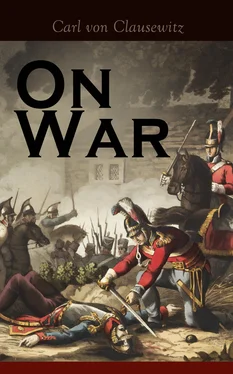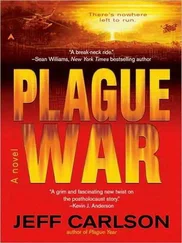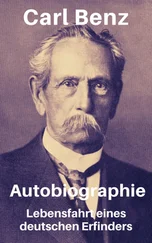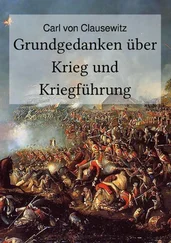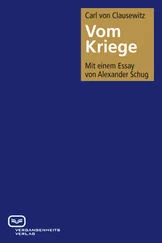Method will therefore be the more generally used, become the more indispensable, the farther down the scale of rank the position of the active agent; and on the other hand, its use will diminish upwards, until in the highest position it quite disappears. For this reason it is more in its place in tactics than in strategy.
War in its highest aspects consists not of an infinite number of little events, the diversities in which compensate each other, and which therefore by a better or worse method are better or worse governed, but of separate great decisive events which must be dealt with separately. It is not like a field of stalks, which, without any regard to the particular form of each stalk, will be mowed better or worse, according as the mowing instrument is good or bad, but rather as a group of large trees, to which the axe must be laid with judgment, according to the particular form and inclination of each separate trunk.
How high up in military activity the admissibility of method in action reaches naturally determines itself, not according to actual rank, but according to things; and it affects the highest positions in a less degree, only because these positions have the most comprehensive subjects of activity. A constant order of battle, a constant formation of advance guards and outposts, are methods by which a General ties not only his subordinates’ hands, but also his own in certain cases. Certainly they may have been devised by himself, and may be applied by him according to circumstances, but they may also be a subject of theory, in so far as they are based on the general properties of troops and weapons. On the other hand, any method by which definite plans for wars or campaigns are to be given out all ready made as if from a machine are absolutely worthless.
As long as there exists no theory which can be sustained, that is, no enlightened treatise on the conduct of War, method in action cannot but encroach beyond its proper limits in high places, for men employed in these spheres of activity have not always had the opportunity of educating themselves, through study and through contact with the higher interests. In the impracticable and inconsistent disquisitions of theorists and critics they cannot find their way, their sound common sense rejects them, and as they bring with them no knowledge but that derived from experience, therefore in those cases which admit of, and require, a free individual treatment they readily make use of the means which experience gives them—that is, an imitation of the particular methods practised by great Generals, by which a method of action then arises of itself. If we see Frederick the Great’s Generals always making their appearance in the so-called oblique order of battle, the Generals of the French Revolution always using turning movements with a long, extended line of battle, and Buonaparte’s lieutenants rushing to the attack with the bloody energy of concentrated masses, then we recognise in the recurrence of the mode of proceeding evidently an adopted method, and see therefore that method of action can reach up to regions bordering on the highest. Should an improved theory facilitate the study of the conduct of War, form the mind and judgment of men who are rising to the highest commands, then also method in action will no longer reach so far, and so much of it as is to be considered indispensable will then at least be formed from theory itself, and not take place out of mere imitation. However pre-eminently a great Commander does things, there is always something subjective in the way he does them; and if he has a certain manner, a large share of his individuality is contained in it which does not always accord with the individuality of the person who copies his manner.
At the same time, it would neither be possible nor right to banish subjective methodicism or manner completely from the conduct of War: it is rather to be regarded as a manifestation of that influence which the general character of a War has upon its separate events, and to which satisfaction can only be done in that way if theory is not able to foresee this general character and include it in its considerations. What is more natural than that the War of the French Revolution had its own way of doing things? and what theory could ever have included that peculiar method? The evil is only that such a manner originating in a special case easily outlives itself, because it continues whilst circumstances imperceptibly change. This is what theory should prevent by lucid and rational criticism. When in the year 1806 the Prussian Generals, Prince Louis at Saalfeld, Tauentzien on the Dornberg near Jena, Grawert before and Ruechel behind Kappellendorf, all threw themselves into the open jaws of destruction in the oblique order of Frederick the Great, and managed to ruin Hohenlohe’s Army in a way that no Army was ever ruined, even on the field of battle, all this was done through a manner which had outlived its day, together with the most downright stupidity to which methodicism ever led.
Table of Contents
The influence of theoretical principles upon real life is produced more through criticism than through doctrine, for as criticism is an application of abstract truth to real events, therefore it not only brings truth of this description nearer to life, but also accustoms the understanding more to such truths by the constant repetition of their application. We therefore think it necessary to fix the point of view for criticism next to that for theory.
From the simple narration of an historical occurrence which places events in chronological order, or at most only touches on their more immediate causes, we separate the CRITICAL.
In this CRITICAL three different operations of the mind may be observed.
First, the historical investigation and determining of doubtful facts. This is properly historical research, and has nothing in common with theory.
Secondly, the tracing of effects to causes. This is the REAL CRITICAL INQUIRY; it is indispensable to theory, for everything which in theory is to be established, supported, or even merely explained, by experience can only be settled in this way.
Thirdly, the testing of the means employed. This is criticism, properly speaking, in which praise and censure is contained. This is where theory helps history, or rather, the teaching to be derived from it.
In these two last strictly critical parts of historical study, all depends on tracing things to their primary elements, that is to say, up to undoubted truths, and not, as is so often done, resting half-way, that is, on some arbitrary assumption or supposition.
As respects the tracing of effect to cause, that is often attended with the insuperable difficulty that the real causes are not known. In none of the relations of life does this so frequently happen as in War, where events are seldom fully known, and still less motives, as the latter have been, perhaps purposely, concealed by the chief actor, or have been of such a transient and accidental character that they have been lost for history. For this reason critical narration must generally proceed hand in hand with historical investigation, and still such a want of connection between cause and effect will often present itself, that it does not seem justifiable to consider effects as the necessary results of known causes. Here, therefore must occur, that is, historical results which cannot be made use of for teaching. All that theory can demand is that the investigation should be rigidly conducted up to that point, and there leave off without drawing conclusions. A real evil springs up only if the known is made perforce to suffice as an explanation of effects, and thus a false importance is ascribed to it.
Besides this difficulty, critical inquiry also meets with another great and intrinsic one, which is that the progress of events in War seldom proceeds from one simple cause, but from several in common, and that it therefore is not sufficient to follow up a series of events to their origin in a candid and impartial spirit, but that it is then also necessary to apportion to each contributing cause its due weight. This leads, therefore, to a closer investigation of their nature, and thus a critical investigation may lead into what is the proper field of theory.
Читать дальше
